(NOTE: The following book review was originally published in The Kansas City Kansan on July 14, 2000.)
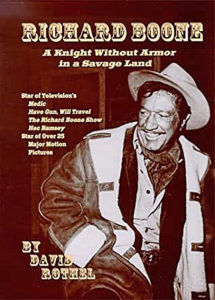 By Steve Crum
By Steve Crum
Richard Boone will forever be Paladin, like it or not. Boone’s western anti-hero was the central character in the long-running TV hit, Have Gun – Will Travel. And for many reasons, the actor did not like it. It is the same old, same old Hollywood story of typecasting. Some learn to live with losing other acting jobs because of being identified with a singular role. Some, like the late Boone, turn to booze and brooding.
At last, someone has written what strives to be the definitive story of the very private Richard Boone, the stage actor who played support in a dozen Hollywood films before being given a starring post in his first TV hit, a doctor show no less; and finally hiding out Tinseltown West to to find his greatest successes as cowboys Paladin and the dubious Hec Ramsey.
Author David Rothel also covers Boone’s impressive but doomed-from-the-start anthology series, The Richard Boone Show. Despite an irritating narrative style, actually non-style, Rothel’s 274-page hardcover, Richard Boone—A Knight Without Armor in a Savage Land ($35, Empire Publishing, Inc.) is an easy and fascinating read.
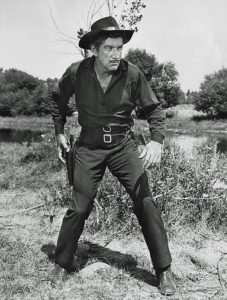 As a long time fan of Boone, I was hungry to discover anything about the man. This is a guy who made 25 pictures and starred in four TV series, and yet this is the first book to chronicle his life and career. (Boone died in 1981.) Try to find magazine or newspaper articles about Boone—even during his time. Sparse. Considering that most people of at least middle age have very fond, even touching, memories of Boone and his work, the publishing of this book constitutes a shameful afterthought.
As a long time fan of Boone, I was hungry to discover anything about the man. This is a guy who made 25 pictures and starred in four TV series, and yet this is the first book to chronicle his life and career. (Boone died in 1981.) Try to find magazine or newspaper articles about Boone—even during his time. Sparse. Considering that most people of at least middle age have very fond, even touching, memories of Boone and his work, the publishing of this book constitutes a shameful afterthought.
Rothel, a full-time language arts teacher, uses the same format he has utilized in 11 books covering the celluloid Western gamut. From his The Gene Autry Book to An Ambush of Ghosts, a Personal Guide to Favorite Western Film Locations, Rothel fills his books with segmented interviews about the particular book’s subject. The interviews are presented the easiest way possible, strictly as Q & A reads, and that simplistic style has its drawbacks. It certainly makes for fast scans in short doses. For example, one of the book’s highlights is the 8-page Johnny Western interview. Western, who performs about once a year in 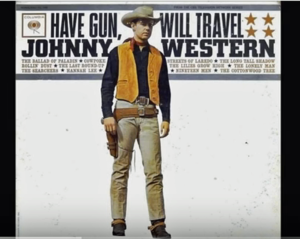 Kansas City and has a daily radio show in Wichita, also wrote and sang the Paladin theme with lyrics, “Have Gun – Will Travel reads the card of the man, a knight without armor in a savage land….”
Kansas City and has a daily radio show in Wichita, also wrote and sang the Paladin theme with lyrics, “Have Gun – Will Travel reads the card of the man, a knight without armor in a savage land….”
Talk about typecasting. No surprise that Western cannot get off any stage without singing this signature. But would you believe that he came close to not getting to perform it on air? Columbia Records producer, Mitch Miller (before his Sing Along TV series) had other ideas.
“Before we were ready to record,” Western recalls, “Mitch 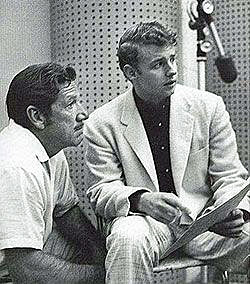 thought about Jerry Vale, who was under contract to Columbia and hadn’t had a hit for years and years.”
thought about Jerry Vale, who was under contract to Columbia and hadn’t had a hit for years and years.”
When Western told Boone about Miller’s plan, Boone immediately got on the phone to New York and reasoned with the producer.
“Listen, you son of a bitch,” blasted Boone, “the kid is going to sing the song and that’s all there is to it!” Western recounts a pregnant pause with Boone finally saying, “I knew you’d see it my way, Mitch.”
“Dick (Boone) just kicked the doors open for me,” said Western, “and I owed him forever and ever and ever.”
Co-stars, stunt men, producers, directors, and relatives (including Boone’s son Peter) recall Boone’s friendship, humor and theatrical brilliance as well as his raucous boozing 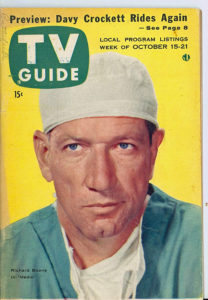
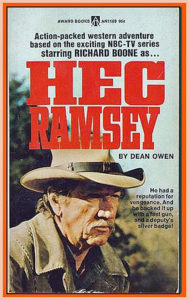 and mood swings that eventually contributed to his ill health and death at age 63. The book also includes a detailed chronology of all Boone’s films and TV work, including his four series, beginning with Medic (1954-56), Have Gun-Will Travel (1957-63), featuring Boone as the man in black who supported his luxurious San Francisco lifestyle by hiring out as a gunfighter. Ratings-wise, it could have gone much longer, but Boone edged out to begin his soon failed anthology series, The Richard Boone Show (1963-64). Hec Ramsey followed in 1972 with a two-year run.
and mood swings that eventually contributed to his ill health and death at age 63. The book also includes a detailed chronology of all Boone’s films and TV work, including his four series, beginning with Medic (1954-56), Have Gun-Will Travel (1957-63), featuring Boone as the man in black who supported his luxurious San Francisco lifestyle by hiring out as a gunfighter. Ratings-wise, it could have gone much longer, but Boone edged out to begin his soon failed anthology series, The Richard Boone Show (1963-64). Hec Ramsey followed in 1972 with a two-year run.
Loaded with showbiz nuggets like the fact that Boone was originally asked to star in Hawaii 5-0, A Knight Without Armor has a very audible bonus. Tucked away inside the back cover is a Johnny Western CD, 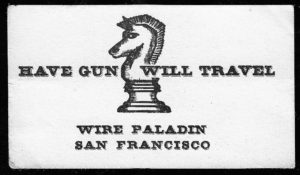 which includes not one the Paladin theme, but the only commercial recording Richard Boone ever made (he narrates to music).
which includes not one the Paladin theme, but the only commercial recording Richard Boone ever made (he narrates to music).
“A soldier of fortune was the man called Paladin,” and that goes for Richard Boone.
∞∞∞∞∞
Grade: B-plus
